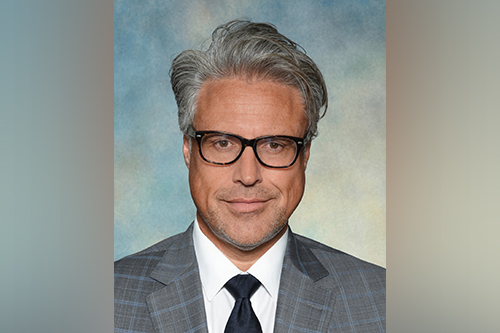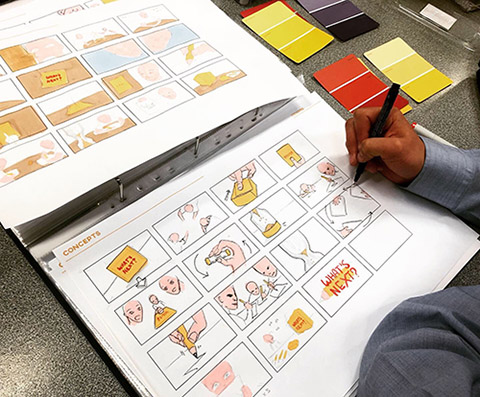
Marcellin College deputy principal, Adriano Di Prato, is recognised as one of Australia’s most innovative thinkers.
Di Prato – who was recently recognised at one of the Educator’s Hot List 2019 winners – has extensive educational leadership experience having worked at a variety of Catholic secondary schools throughout metropolitan Melbourne over the past 20 years.
Notably, Di Prato has been working with Future Schools Alliance (FSA) in sharing knowledge and expertise with member schools via scheduled events and online UnScriptED webinars.
An area that features prominently in Di Prato’s knowledge and expertise is design thinking.
He says that while project-based learning (PBL) isn’t new, it is becoming more relevant for personalised learning in today’s schooling.
One of the central features of high-quality PBL, says Di Prato, is the pedagogical relationship between the driving question and the “need to know” that stems from it – the deep dive inquiry.

Below, Di Prato tells The Educator about the power of Design Thinking and its impact on student learning.
TE: You presented at the 2019 CaSPA Conference in Adelaide and at the 2019 IBSC Conference in Montreal, Canada about the power of Design Thinking and its impact on student learning. What were some of the key messages for school leaders out of this presentation?
AD: From the 2019 CaSPA Conference in Adelaide, Australia: At this conference I was invited to present Marcellin College’s new dynamic and future-focused learning ecosystem, titled Polaris which commences from 2020. At the conference I outlined the case for educational change in Australia, having been a hot topic for several years and not limited to just Marcellin College. To equip today’s students for the workplace of 2030 and beyond, a whole new schooling framework is needed, now. Marcellin College needs to embrace educational change and become part of the movement to re-imagine schooling in Australia and across the globe. Polaris is essentially about future proofing. Exploring the learning of tomorrow is an act of stewardship to our future communities and to the young people who will live in them.
From the 2019 ISBC Conference in Montreal, Canada: For many years the College’s Senior Visual Arts program have successfully been using rubrics as a formative assessment tool. This has led the College to invest in an Action Research Grant to determine the effectiveness of rubrics across all learning areas.
At the 2019 IBSC Conference in Montreal Canada the presentation I prepared focused on a case study-based approach in the use of a design thinking pedagogy for VCE Unit 3 & 4 Visual Communication Design (VCD). This conference workshop illustrated an increase in staff’s transformation from a largely summative assessment-based approach to using new and larger volumes of formative assessment. Due to the passing of my father the day prior to my departure for Canada my colleague Trent Williams did the presentation without me. Trent was responsible for the Action Research Grant.
TE: Can you tell us about some of the most inspiring and impactful examples of design thinking you’ve seen in action at Marcellin College?
AD: At Marcellin we build on methods from across the fields of design to create learning experiences that support young men in unlocking their creative potential and applying it to real world contexts. Our goal is to help each student use design thinking as a metacognition mode of learning how to learn to grow, to connect and to make change.
The best example of the impact of using Design Thinking as a pedagogical methodology has been in VCE Visual Communication Design. Design Thinking has led to an increase in student engagement, motivation and academic outcomes in the area of Visual Communication Design, often outperforming the school median study score by a minimum of four higher points, each year.
TE: Having worked at a variety of Catholic secondary schools throughout metropolitan Melbourne over the past 20 years, what are some of the most significant emerging trends you see facing the sector?
AD: Short answer is relevance. We know that religion is suffering, it’s clearly on the nose. One only has to look at the 2016 Australian Census data to see we are on a secular slide with 29.6% of people saying they have ‘no religion’. With Australia’s rapidly changing population more godless perhaps the broader question for Catholic educators should be, the relevance of this rich faith history for today’s world and schooling. A world that all are anxious in its uncertainty, particularly the young, whom are often paralysed by their own sense of entitlement and individualism. It might not surprise you that I still believe Catholicism is worth staying in. I believe in what the Gospel inherently proclaims and Jesus’ unwavering mission of love, compassion and forgiveness. Catholic schools today need to bring a different perspective, a harmonious witness to today’s schooling for tomorrow’s world.


